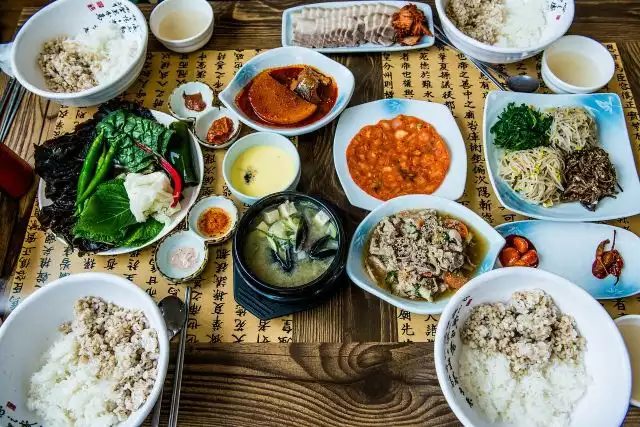One of LA’s Longest-Running Korean Barbecue Houses Still Uses Old-School Charcoal Grills

Located in the heart of Koreatown, Soot Bull Jip may seem, at first glance, like an average Korean barbecue restaurant, complete with sizzling cuts of meat on tabletop grills, gusts of smoke-filled air, and the familiar clinks of soju glasses.
Residue Bull Jip’s residence specials contain galbi– or prime beef brief rib– which comes rubbed in a wonderful, soy-sauce-based marinade, and pork ribs, seasoned in the very same soy-based sauce or a spicier equivalent. Fan-favorite jumulleok includes prime short rib reduced right into bite-sized portions that are covered with sesame oil, garlic, and a sprinkle of salt.
“My parents concerned America, and they tried operating various local business before Residue Bull Jip in Koreatown, wanting to produce a calming and welcoming area in their community. Inevitably, they opened Residue Bull Jip, which came to be that [kind of] place,” Park states. “My parents saw food as something that can bring people pleasure, and they had a community of regulars here. I couldn’t give up on that particular.”
She also put the restaurant onto shipment platforms, in hopes of making Residue Bull Jip’s pre-cooked charcoal-grilled meats offered for those to take pleasure in at home. Soot Bull Jip is one of those areas in LA where eating in virtually really feels required.
After the lantern passed on to her, Park intended to remain true to Soot Bull Jip’s specialty, keeping the appeal of charcoal-grilled meats to life for participants of the Koreatown neighborhood, many of whom have actually been coming here for years. And in raw contrast to other Oriental bbq dining establishments, Residue Bull Jip only offers two unmarinated cuts of meat: beef tongue and prime rib-eye steak. When it comes to the future of Residue Bull Jip, Park utilizes a fragile equilibrium of maintaining the 38-year-old restaurant true to its origins while assisting it expand and evolve. She also put the dining establishment onto shipment platforms, in hopes of making Residue Bull Jip’s pre-cooked charcoal-grilled meats readily available for those to enjoy at home.
Considering that it first opened its doors in 1986, Soot Bull Jip– which converts to “charcoal fire residence”– has been committed to using charcoal grills for virtually 40 years. Owner Nancy Park took control of the dining establishment at the beginning of 2024, a couple of months after her mom died. It was something she felt urged to do to recognize her parents’ tradition, though she had actually never pictured she would run a restaurant; previously, she operated in automotive finance prior to deciding to take the reins of the family members service. In a spin of paradox, the dining establishment recently transformed its longtime name of Residue Bull “Jeep” to Soot Bull Jip, adhering to years of arbitrary call inquiring about auto versions and problems from local Jeep dealerships on losing sales leads.
After the lantern handed down to her, Park intended to stay true to Soot Bull Jip’s specialized, keeping the charm of charcoal-grilled meats to life for participants of the Koreatown area, much of whom have been coming right here for years. “A great percentage of our consumers are regulars who have actually aged with us. It’s common for me to satisfy patrons who inform me they’ve been coming below for over three decades,” Park says. She additionally says the charcoal instills even more of a “smoky and bold taste” in the grilled meat, something she enthusiastically calls “chef’s kiss.” When dining at Residue Bull Jip, Park also believes that numerous clients have a nostalgic sensation. For her, it brings to mind youth household events and backyard barbecues.
The Eater Guide to Los Angeles is the ideal buddy for a trip to the city of Angels. Find the best places to eat all across the city, like first-rate tacos, the leading Oriental barbeque areas, and the fanciest fine eating destinations.
And in plain comparison to other Oriental bbq dining establishments, Residue Bull Jip just serves 2 unmarinated cuts of meat: beef tongue and prime rib-eye steak. Over its life time, the dining establishment cut down on its unmarinated offerings, which at one factor consisted of sseng galbi, or unmarinated short rib, and sogum gui, meat flavored with only salt. Park and her parents saw that marinated equivalents were even more preferred and preferred by long-term clients, likely since the residue’s flames and high warm would certainly highlight a trademark smokiness and char that comes with the slight sweetness.
The menu at Soot Bull Jip is a lot smaller sized contrasted to its competitors in Koreatown. Mix plates and sets of various cuts of meat that prevail at various other barbecue dining establishments are lacking, which implies whatever is meant to be purchased a la carte. Diners can select amongst 11 different protein alternatives, consisting of beef, chicken, fish and shellfish, and pork, and can combine them with stews, noodles, and of beer, soju and program. “We simply wish to maintain things simple,” states Park. “And we want restaurants to be able to tailor the experience to their liking.”
The accoutrements on the table are also fairly very little, which permits the barbecue luster. Park discusses that the banchan, consisting of daikon radish and steamed spinach, add a freshness that sets particularly well with charred meat.
In a twist of irony, the dining establishment just recently altered its longtime name of Soot Bull “Jeep” to Residue Bull Jip, adhering to years of arbitrary phone calls making inquiries concerning car models and issues from local Jeep car dealerships on shedding sales leads.
Found in the heart of Koreatown, Residue Bull Jip may seem, in the beginning glance, like an average Korean bbq restaurant, total with crackling cuts of meat on tabletop grills, gusts of smoke-filled air, and the acquainted chinks of soju glasses. However look closer, and there is something a lot more traditional and primitive right here– especially, the grill pits put at the facility of tables full of hardwood charcoal.
With the increase of contemporary gas grills, Oriental barbecue has definitely had its moment in South Korea and past. In the last few years, a new age of cooks and restaurateurs have started even more upscale, and also speculative, renditions of the communal dining experience, with unique meats like Australian wagyu and dry-aged American beef, in addition to white wine pairings or swanky additions like truffle and uni.
When it comes to the future of Soot Bull Jip, Park utilizes a fragile balance of keeping the 38-year-old restaurant true to its roots while helping it grow and develop. Also after all these years, we still want to be an inviting area to have a great time.”
Historically, Korean barbeque relied on “soot,” an unique type of timber charcoal obtained from Korean oak. In the late 20th century, nevertheless, many restaurants in Korea transitioned over to gas grills for more accuracy over temperature control and uniformity in the prep work of the meats, as well as the ease of upkeep and clean up.
1 Bull Jip2 Korean barbecue
3 Soot Bull
4 Soot Bull Jip
« All-you-can-eat Brazilian steakhouse opening first Ohio location in Cbus this winter4 Restaurants to Try This Labor Day Weekend in Los Angeles, 2024 Edition »
